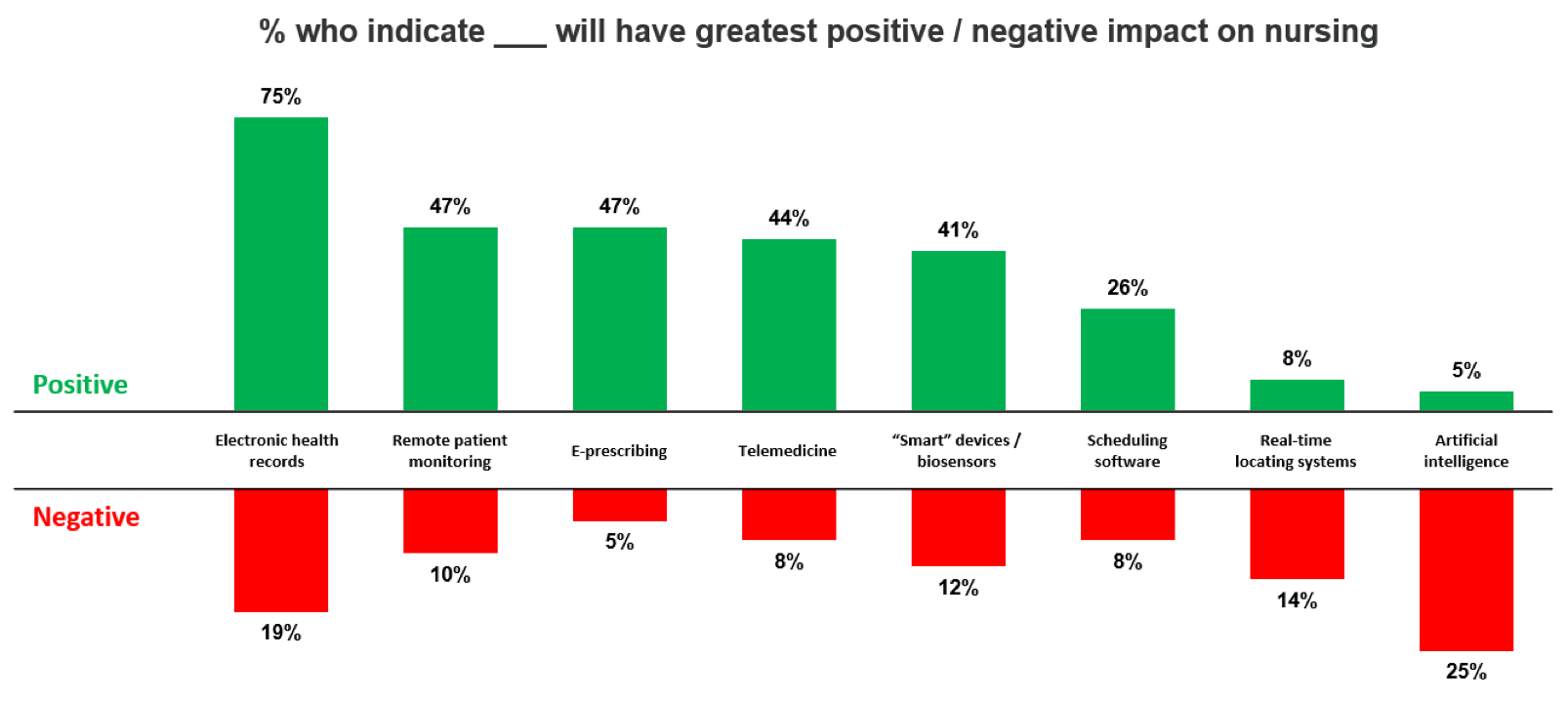Quick question: what skills are required to be successful in the nursing field today? If you were to say compassion, good bedside manner, quick thinking, or good time management, of course you’d be right. But increasingly these days, a facility with technology is just as important.
With EHRs now mandated in hospital environments, data input is now a critical—and time-consuming—part of a nurse’s job. And while technology can certainly improve aspects of nursing, it’s also distracting many nurses from a critical part of their job—patient care. Let’s examine in today’s “Hot Topic” blog post.
Moving from the bedside to the keyboard
I became interested in exploring this issue when spent some time in the hospital recently. Don’t worry, it was all for a happy event – I served as birth coach for my sister as she delivered her first baby. (Everyone is happy and healthy!) During my time in the hospital, I met quite a few nurses, and I witnessed first-hand how they interact with technology.
A few things I noticed during my short stay in the hospital:
- Every time a new nurse came on duty, she would log into the computer and ask my sister the same series of questions. “Do you drink? Do you smoke? Have you ever been treated for depression?” etc. While required from an EHR standpoint, from the patient standpoint, it seemed redundant to be asked these questions over and over again by each new nurse who started a shift. (Especially during a 24-hour labor when my sister wasn’t quite in the mood to talk and there were quite a few shift changes.)
- The documentation in the EHR was very extensive. Every conversation with my sister required a note in the system. Every request – no matter how small, like a glass of water – was “on the record.” The nurses probably could have written a novel on my sister’s labor.
- Several nurses who came in to talk to my sister actually apologized for having to type things into the computer. “I’m sorry, I should be next to the bed right now, but I’m required to answer all these questions on the computer,” one nurse said. “I hate that I’m not looking at you right now as you’re talking to me, but I need to enter all this,” another nurse commented.
Featured resource: How Successful Are Healthcare Organizations with Clinical Analytics?
Read the survey results
How do nurses feel about technology?
Overall, nurses do see the benefits that technology brings to their field. According to a LinkedIn survey of more than 600 nurses, 82% said they have a somewhat or very positive view of how technology impacts patient care. But that doesn’t mean they aren’t feeling the pains of technology implementation. Nurses also said it has added time into their work day.
When it comes to specific types of technology:
- 75% believe EHRs will have a positive impact on nursing
- 47% believe remote patient monitoring or e-prescribing will have a positive effect
- Only 5% believe artificial intelligence will have a positive effect, while 25% believe it will have a negative effect

Source: LinkedIn, https://www.linkedin.com/pulse/artificial-intelligence-could-completely-transform-patient-kutscher/
Researchers believe this is because many nurses fear that AI solutions will take the human touch out of nursing and diminish the need for critical thinking skills.
How does technology contribute to burnout?
One issue when it comes to EHRs or other healthcare technology is provider burnout. In fact, in a study published by the National Institutes of Health, 50.3% of nurses surveyed said that EHRs added to their daily frustration and 32.8% reported insufficient time during the work day for documentation.
This problem is especially acute given that there is a nursing shortage in the U.S. And it is only expected to grow over the next several years. Hospitals and health systems need to ensure that nurses aren’t being overburdened by the technology they are expected to use.
How to solve the problem?
In my view, there are a few things health systems should think about as they integrate technology into nursing.
- Smoother integration into workflow: Right now, many nurses feel as though the technology they are being asked to use does not fit in with how they normally go about their jobs. When implementing new tech, hospital leaders should consider workflow and aim to reduce disruptions. One smart way to do this is to work with nurses and ask them for input on the workflow process.
- Training and ongoing education: Oftentimes with new technology, there will be training that happens at the beginning of an implementation, but then quickly ends. With a large technology deployment, there needs to be continual on-the-job training to address any issues that arise during the work day. In addition, many nurses might not be comfortable with technology and did not have to take any tech classes when they received their nursing degree. For these nurses, it’s helpful to offer education assistance to get them more acquainted with the technology they are expected to use.
- Consider the patient first: Ultimately, it’s important for hospitals to take a patient-centric view when it comes to any technology roll-out. In the long-run, that will benefit nurses as well since patient care is their first priority. The number one complaint I heard from the nurses at the hospital where my sister had her baby and from other nurses I’ve talked to was that the computer was impeding the way they were used to caring for their patients. That doesn’t sit right. Any hospital technology initiative should be designed by thinking about the patient first and figuring out workflow issues, etc. without compromising that care.
Conclusion
While many nurses lament the introduction of technology into their jobs, the fact is that the technology is here to stay. And truth be told, nurses will probably have to deal with even more of it in the future. The challenge for hospital leaders is how do they integrate this technology in a way that enhances the role of nursing and ultimately improves the care they provide to patients?
Other “Hot Topic” blog posts
- Solving Hospital CEOs’ Pressing Challenges With Analytics - April 15, 2024
- Navigating the Wellness Wave: Wine & Spirits Data Strategy - April 9, 2024
- Takeaways from HIMSS24 - March 26, 2024




